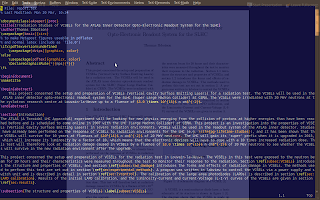I was watching a screencast by heathenx recently (Episode 86 on screencasters.heathenx.org), about creating presentations that run in your browser using Inkscape and JessyInk. At about the same time I was looking into html5 embedded video (thanks to the GoogleIO html5 demos). Then I noticed a blog post by bluish coder about embedding html5 video in svg files. This all collided in my head, and I thought: "hey, I can use this to embed movies in JessyInk presentations". So that's exactly what I've done.
The final product is a presentation in Inkscape svg, using JessyInk with an embedded movie from www.sciencecommons.org. It also doubles up as a rough tutorial on the technique I used to embed the movie. To actually be able to see the movie you'll need an HTML5 enabled browser such as Firefox 3.5 beta 4 (that's the only one I've tested it with). Enjoy....
http://users.ox.ac.uk/~orie1195/JessyInk_embed_movie.svg
Friday, 5 June 2009
Wednesday, 6 May 2009
Fullscreen transparent gvim

Thought I'd have a go at making a my gvim fullscreen. At the same time I thought it would be cool if it were also transparent. You can see what it looks like in the screenshot. Here I am editing a LaTeX file, using Vim-LaTeX and I have the pdf open behind it.
To do this I needed to turn on the shortcut in Gnome for making windows fullscreen. System->Preferences->Keyboard Shortcuts->Toggle fullscreen mode which I set to Alt+F3.
To make the screen transparent I used transset, which is available in the repositories. To use it run transset in a terminal which gives you a cross as a pointer and simply click on the window you want to make transparent. It will set that window to 75% transparency for you. Note that you have to be running a compositing manager i.e. Compiz for this to work.
I also put this line in my .gvimrc:
set guioptions-=T
which gets rid of the toolbar. I'll probably fiddle further with these settings later depending on how much stuff I want on the screen.
Wednesday, 29 April 2009
Collaborative editing
I'm writing a scientific paper at the moment, and I am trying to come up with good ways to do collaborative editing. I am the main author and am doing all the editing myself, but there are several others in my group who write comments. I currently have the source in a Git repository, but I'm really the only one using it.
The way it currently works is that I send out a .pdf of the paper and the rest of the group make comments on it, either by email, or by using the annotation features of Adobe Acrobat reader. Unfortunately acroread doesn't run so well on my Linux machines and its very annoying to try and read the comments. I'd like to come up with a better way of sharing comments. Ideally the comments would be made on the LaTeX source, but that is obviously not the complete document, and there needs to be a way to make comments on the figures as well.
In searching around I've come across this website: http://en.wikibooks.org/wiki/LaTeX/Collaborative_Writing_of_LaTeX_Documents, which I think is quite good, but getting all my colleagues to start using version control systems seems unlikely to happen and isn't really what I want.
The way it currently works is that I send out a .pdf of the paper and the rest of the group make comments on it, either by email, or by using the annotation features of Adobe Acrobat reader. Unfortunately acroread doesn't run so well on my Linux machines and its very annoying to try and read the comments. I'd like to come up with a better way of sharing comments. Ideally the comments would be made on the LaTeX source, but that is obviously not the complete document, and there needs to be a way to make comments on the figures as well.
In searching around I've come across this website: http://en.wikibooks.org/wiki/LaTeX/Collaborative_Writing_of_LaTeX_Documents, which I think is quite good, but getting all my colleagues to start using version control systems seems unlikely to happen and isn't really what I want.
First post
I don't think I'll be able to keep this up for long, but I'm often doing things with my home computer, playing, configuring etc. and I usually forget all about it quite quickly so I thought I'd better write some of it down. I used to use Google Notebook, but I think other people might sometimes benefit from the stuff I've learnt along the way.
I use Ubuntu Linux as my main operating system on both my laptop and my home desktop, so most of the stuff I post here will be oriented that way.
I hope this turns out to be useful for someone other than myself.
I use Ubuntu Linux as my main operating system on both my laptop and my home desktop, so most of the stuff I post here will be oriented that way.
I hope this turns out to be useful for someone other than myself.
Subscribe to:
Comments (Atom)